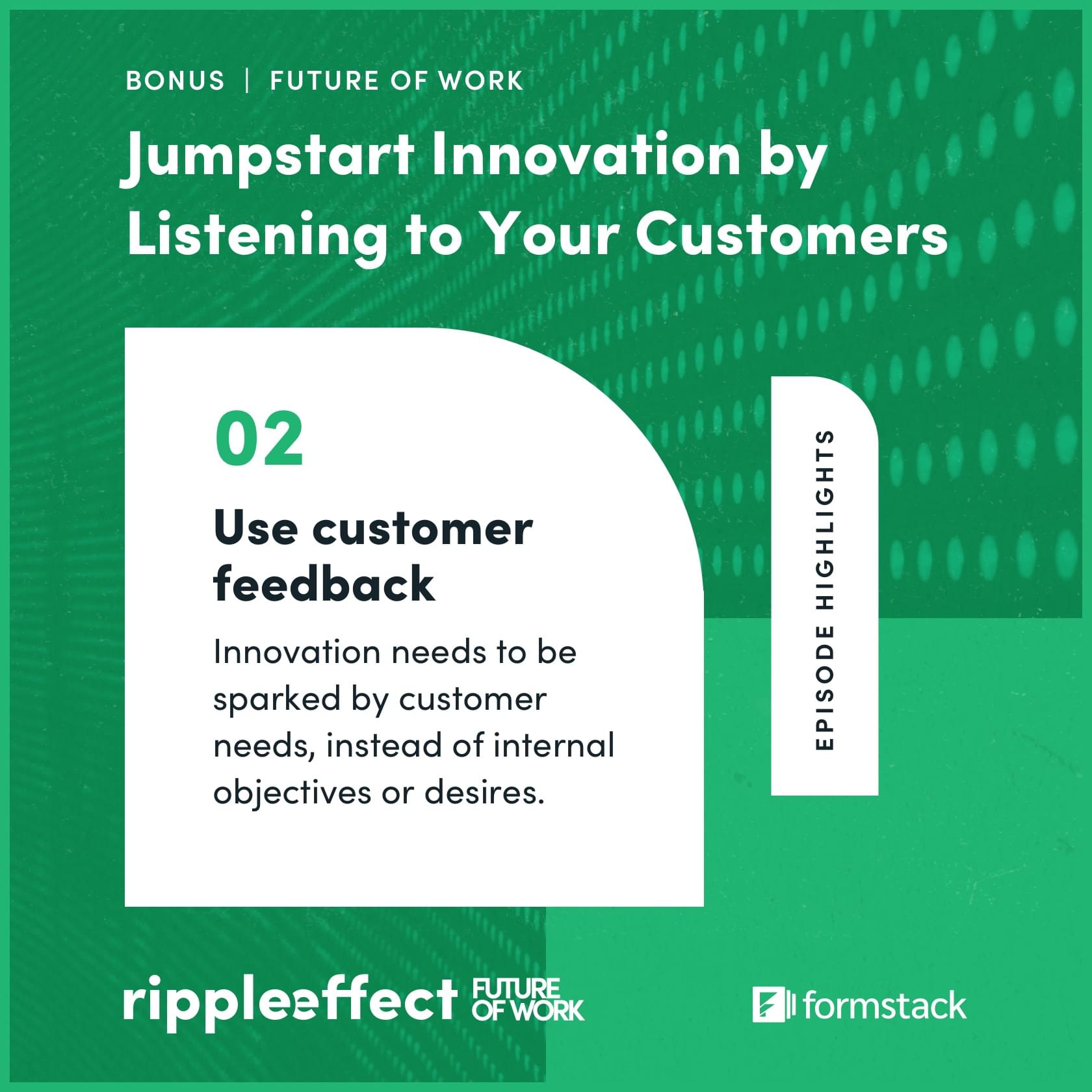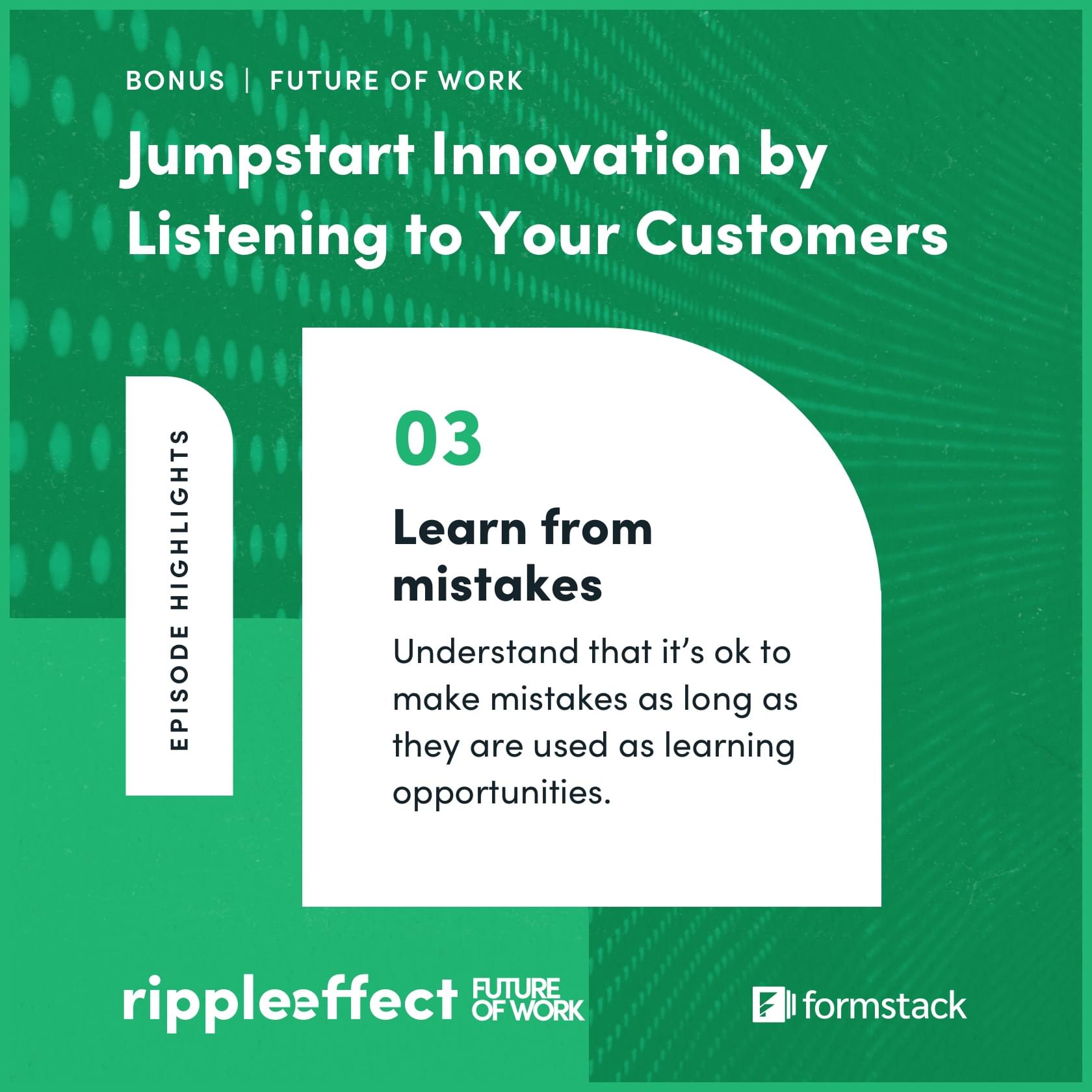The word innovation is powerful. It leads many to think of companies like Google, Amazon, Apple, and Microsoft. Take a few moments to scroll through the news, and there’s bound to be an article about the next big innovation in tech, healthcare, or food production.
But what does innovation actually mean?
According to Merriam-Webster, the definition is quite simple. In its most basic form, it represents something new.
.png)
But even with this simplicity comes difficulty. Many organizations, departments, and people often struggle to innovate and come up with new ideas. What’s the secret to discovering and developing “the next big thing”?
In a recent Ripple Effect podcast Future of Work episode, Chief Strategy and Product Officer at Smartsheet Gene Farrell provided some pro tips. One of his best takeaways was this:

Listen to his episode now: Jumpstart Innovation by Listening to Your Customers
Gene’s episode inspired us to dig more into the topic of innovation. What are some strategies that can be used to jumpstart innovation? Are there certain processes or systems that deter us from innovating more often? How can leadership better equip their workforce to think big?
Read on to discover five ways to increase innovation at your organization.
1. Empower teams to make decisions.
Decision paralysis happens when we have too many options and are unable to decide on a single solution. This can quickly derail many projects or teams. But something much worse is not empowering a team or individual to make a decision in the first place.
Layering on multiple levels or approvals in order to make a decision can kill innovation faster than any type of decision paralysis can. When teams or individuals don’t feel supported or trusted in making decisions, they can quickly lose confidence in their ability or skills to innovate.
Empowering teams through decision making is a great way to increase ideas within your organization. When workers feel confident, they are more likely to pursue new, innovative projects. Eliminating some of the “red tape” around decision-making can help foster a culture of innovation and make way for more ideas to come to the forefront.
Related: How to Become a Better Problem Solver
2. Listen to customers.
Whether you sell a product or perform a service, you might think you know what is best as far as your offerings go. Taking the time to brainstorm and ideate on your next product or service offering is definitely important, but it’s not the single solution to answering the question of “what’s next?” You need to bring your customers into the mix.

Some of the best ideas emerge from customers. Relying on employees to always be on the cutting edge or discovering the next innovation limits creativity. Your customers are an excellent source when it comes to innovation, ideas, and deciding on what the next priority should be.
Take time each to look at customer feedback, whether that’s reading surveys, listening to calls, reviewing customer suggestions, or culling through reviews. You may be surprised by how innovative customers can be!
Even if it doesn't outright spark your next big idea, customer feedback can be a great way to discover patterns, common needs, and gaps in your offerings.
3. Provide the needed time and resources.
Think of innovation like a flower; it can’t flourish without the necessary resources. While a flower needs water and sunlight, taking ideas from inception to launch requires time and resources, like money, human capital, and technology.
If teams are pressed to innovate without the necessary time and resources, they will constantly spin their wheels. New ideas may come to fruition, but acting on those ideas may be nearly impossible. Innovation doesn’t happen overnight, and it rarely happens on a shoestring budget. Setting aside the appropriate time, people, resources, and tools will help set teams up for success and limit burnout, stress, and anxiety.
Did you know? Formstack recently conducted a survey of more than 400 full-time employees across the U.S. 63% reported spending two or more hours per day—a full work day each week—on repetitive administrative tasks such as email, data collection, and data entry. That's less time for teams to be spending with customers and innovating.
4. Break patterns and stop thinking, “That’s how it’s always been.”
The definition of insanity is doing the same thing over and over again while expecting a different outcome. For many organizations, this definition of insanity plays out in a dangerous way.
We all get stuck in common patterns of behavior or settle into ways of doing things. It’s another frustrating theme of being human. But this behavior can have unsettling consequences. When times change and issues arise, we can find ourselves stuck by providing a familiar excuse: “That’s how it’s always been.”
The world is rapidly changing around us, and what worked last week may not work this week anymore. Innovation can only truly blossom when we’re able to step back from our norms, patterns, and comforts to see the larger picture at play. It can be easy to fall back on old solutions, but that can hinder you from making progress toward seeking out truly innovative solutions.
5. Understand it's ok to make mistakes.
Making mistakes is part of being human. They are impossible to eradicate completely, and trying to ignore them only leads to making more. The best way to improve innovation is by acknowledging when mistakes happen, and learning from them.

Using mistakes to point out the shortcomings of people, projects, or initiatives will only set you and your team back. Instead, use mistakes as a way to learn and grow. When trying something brand new, it’s impossible to know what the end results will be unless you try.
If things go awry, take a moment to identify what went wrong and why. Share the learnings with teammates in a positive way—one that encourages them to continue trying new things while being aware that things could go wrong. If they do, use the instance as a learning experience to improve the next step in the process or problem they tackle.
Start innovating more!
By infusing the tips above throughout your workplace, you can help spur innovation and encourage teammates to think big. In a world that is constantly changing, it’s important to continue adapting and rolling with the punches. This can only be done by trying out new ideas, including various perspectives, and making the time to put innovation as a priority.
Learn more about how to spur innovation at your organization by listening to the Ripple Effect episode Jumpstart Innovation by Listening to Your Customers now. Gene Ferrell, inventor of the Coca-Cola freestyle machine and Director of Product and Strategy at Smartsheet, provides tips on how to support innovation throughout your organization.











